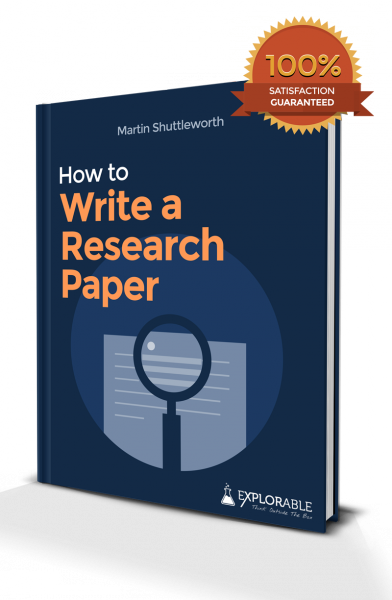
- Home >
- Research Paper Topic Ideas
Research Paper Topic Ideas
Actually thinking of what to write about for your research paper is one of the most difficult parts of writing any scientific report.
This article is a part of the guide:
Browse Full Outline
Hopefully, this article will give you some research paper topic ideas. It is normal to feel a little nervous and apprehensive about the whole thing.
If you are organized and thorough, and follow the tips below, you will have no problem. There are always people around to help you; they do not want to see you struggle or fail, so do not be afraid to ask questions.
A list of different research paper topic ideas.

TOPIC IDEAS Tips
- Try to pick a topic that you are interested in. You are going to have a lot of research and experimentation ahead of you so it helps to produce good science if you have enthusiasm in what you are doing. Find a broad topic and do a little preliminary work, perhaps making a shortlist of possible areas of interest.
- Be realistic. If you have difficulty with transport then there is no point picking a project in some far-flung, inaccessible area. You may have to go back to re-sample or clarify your data. For a field study that requires lots of walking or climbing you need to be reasonably fit. If you are not very good at approaching strangers then avoid a subject that requires you to ask people to fill in questionnaires. Play to your strengths and avoid your weaknesses.
- What type of research do you like? Try and pick a type of research that interests you. Some people might enjoy working in a lab, others sampling in the field. There is no point picking a project with lots of statistical analyses if you hate doing calculations. If you hate book research then try and pick a subject that does not need much.
- With the above in mind, check out the facilities your department offers. For example, some departments offer help with statistics or using computer programs.
- Take into account the amount of time and resources you have. It is better to pick a focused topic and be thorough than to try and perform some complex experiment that you struggle to finish. Your topic must be broad enough to ensure that you have enough data but narrow enough to maximize your time and resources.
- Whilst this is very much a personal decision, sometimes it is better to try and make sure that you think you can work with your supervisor.
- Sometimes departments have a list of suggested topics; if any of these interest you then talk to the named supervisor and see what it entails.
- Try and be a little different; if a large number of students research the same topics then there could be a lot of people fighting over one copy of a book or journal.
- Will you need help? For some areas of research you may need to ask the help of friends to take samples. An example is psychology where you need to entice people to answer your questions or perform your tests. What measures will you need to entice people? Asking favors, bribery or threats? Try to ensure that you have thought about this before you start.
- Remember that people are there to help you. If you not sure of where to start, often the most difficult part, do not be afraid to ask questions from those more knowledgeable in the subject. It is common to feel a little nervous and overwhelmed before starting on a long project but that will pass. Remember that the reputation of your supervisor and department is judged by how well you perform in your research paper so they will try their best to guide you.
Check out our quiz-page with tests about:
Martyn Shuttleworth (Jun 5, 2009). Research Paper Topic Ideas. Retrieved Feb 18, 2026 from Explorable.com: https://explorable.com/research-paper-topic-ideas
You Are Allowed To Copy The Text
The text in this article is licensed under the Creative Commons-License Attribution 4.0 International (CC BY 4.0).
This means you're free to copy, share and adapt any parts (or all) of the text in the article, as long as you give appropriate credit and provide a link/reference to this page.
That is it. You don't need our permission to copy the article; just include a link/reference back to this page. You can use it freely (with some kind of link), and we're also okay with people reprinting in publications like books, blogs, newsletters, course-material, papers, wikipedia and presentations (with clear attribution).
This article is a part of the guide:
Browse Full Outline
Footer bottom




